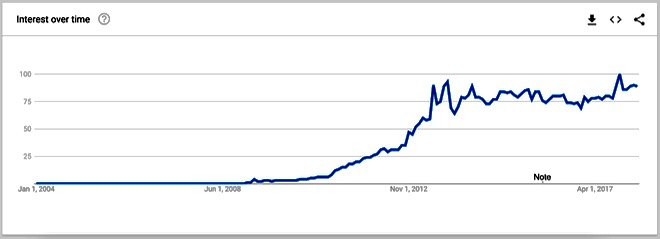Joining the Social Media Conversation: What is a Hashtag? How do you use Hashtags?

What is a hashtag? How do you use hashtags?
If you are reading our weekly columns on book marketing and publishing trends, then you probably can answer both questions easily. But consider this: Today, those will be two very popular Google searches by people around the world. After all, just look at the chart of public interest in hashtags from Google Trends. It wasn’t until that the Oxford English Dictionary acknowledged that hashtag
was a word!
If you sign up to receive our free weekly columns by email, you’ll find that David Crumm and I often talk about trends and techniques related to social media. Don’t worry. We not trying to over-stress your already busy week. We don’t urge you to use every single form of social media every day. Our advice: Be smart about the most popular platforms and use the ones that match your own daily approach to the world. We keep emphasizing: The key to social media is authentic, friendly contact with friends and followers. It is, after all: Social.
 Today, part of being a helpful citizen in the social network is letting readers find themes that interest them in an ocean of media. If you’re a writer—of a blog, a weekly newsletter, a magazine, a book—you need to know the basics of hashtags.
Today, part of being a helpful citizen in the social network is letting readers find themes that interest them in an ocean of media. If you’re a writer—of a blog, a weekly newsletter, a magazine, a book—you need to know the basics of hashtags.
What is a hashtag?
A hashtag will turn a topic or phrase into a clickable or searchable link in your post, tweet, board or article. Hashtags helps people find posts about their favorite topics. To make a hashtag, use # (the number sign) along with a topic or phrase and add it to your post. Just remember, a hashtag must be written as a single string of characters without any spaces. You can include numbers in a hashtag, but punctuation and special characters (like $ and %) won’t work. Keep them simple. For example: I just read the best new book! #book.
Each social media platform has a slightly different policy and method for organizing hashtags. In general, though, when you click a hashtag or search it, you’ll see a feed of posts that include that hashtag.
If you’re like me, you’ve been hearing lots about keywords in the publishing industry. A hashtag is just another form of a keyword.
Have you’ve seen the hashtag #MotivationMonday or #WellnessWednesday? They are some of the hashtags that get used every week on Twitter, Facebook and Instagram. If you’ve written a book that is motivational, Monday is your day! Spotlight different chapters or thoughts from your book each and every Monday. Especially on Twitter, do this occasionally throughout the entire day so that that you get the most exposure—those tweets keep rushing past people like a never-ending waterfall.
You could pay for scheduling of posts or tweets with companies like Hootsuite, or you can be disciplined and do it yourself. Draft your tweets or posts ahead of time and then post them in 3 or 4 hour intervals. It’s easy enough to do, or pay someone else to do it, but as they say at Nike: Just Do It!
How can you use holiday hashtags?
Check out our earlier column about holidays and festivals—especially those themed days and weeks and even months that raise timely awareness of everything from Asparagus to Zoos.
What are hashtag trends?
If you plan to make regular use of hashtags, I suggest you explore some of the free tools that will help you make the most of these powerful keywords. One tool I like is Hashtagify, an online tool that searches popular hashtags. It allows you to search among more than 12 million Twitter and Instagram hashtags and pick the best ones for your needs based on their popularity, relationships, languages, influencers and many other metrics.
Why not try it right now? Click on one of the social media buttons at the top of this column, share it with friends—and add a hashtag!